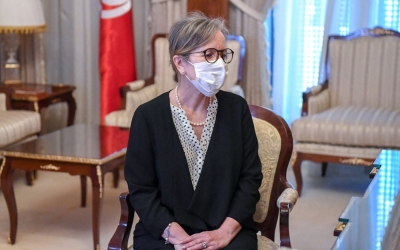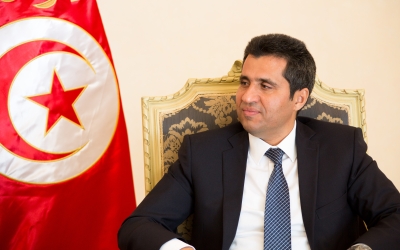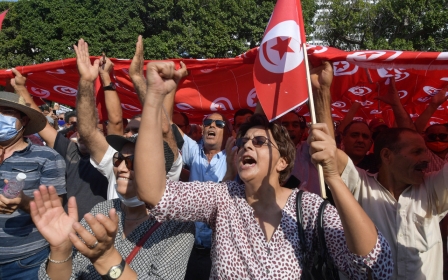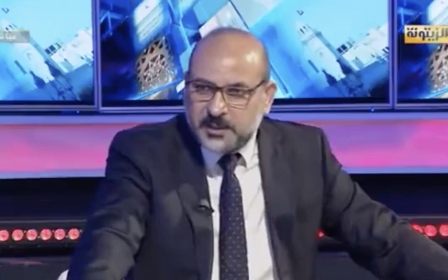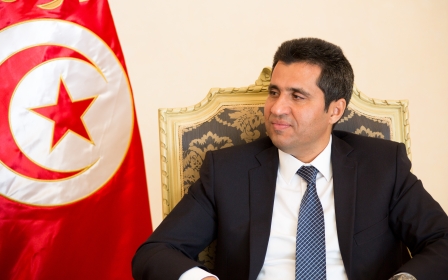Tunisia: Arrest of journalist prompts concerns about future of press freedom under Saied
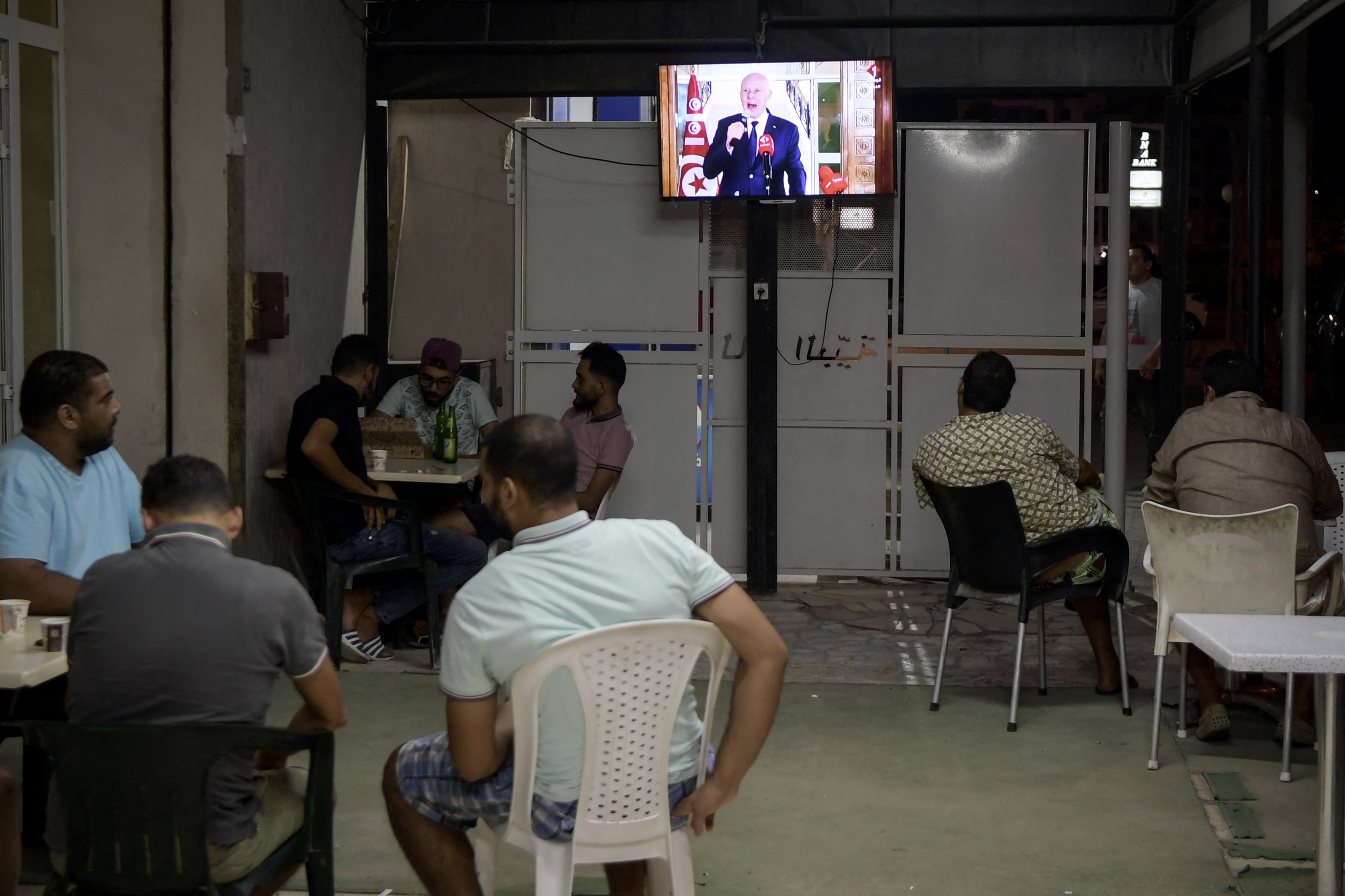
The recent arrest of a journalist and lawmaker critical of President Kais Saied in Tunisia has triggered warnings that press freedom in the country is at risk.
On Monday, Lawyers for the Protection of Rights and Freedoms expressed solidarity with journalists who have been subjected to abuses since Saied's power grab in July, widely branded as a coup.
The last targets of the crackdown were presenter Amer Ayad and his guest, MP Abdellatif al-Alaoui. Both were arrested by virtue of a military court order for "expressing their own views during a broadcast," their lawyer said.
Alaoui and Ayad both criticised the president's choice of Najla Bouden Romdhane as Tunisia's first female prime minister on the Hassad 24 programme, with the latter saying that she would serve solely as a "servant of the sultan". Both individuals were later detained on accusations of "plotting against state security".
The arrest was the latest in a series of detentions of Tunisian legislators and Saied critics, after the latter suspended parliament, dismissed the prime minister, and took on wider executive and judicial powers on 25 July, the latest of which was introducing measures that effectively allow him to rule by decree.
New MEE newsletter: Jerusalem Dispatch
Sign up to get the latest insights and analysis on Israel-Palestine, alongside Turkey Unpacked and other MEE newsletters
The lawyers' NGO said that since 25 July, the country has witnessed a pattern aimed at subjugating the media and "bringing it to its knees", warning that the "policy of silencing mouths will not stop at opponents of the coup but will expand to include everyone, as an inevitable and executed result of a coup."
The statement listed a number of violations of media freedoms carried out since Saied's decisions, including the closure of Al Jazeera headquarters, halting several TV programmes, and the referral of media professionals to military courts.
The organisation urged all journalists to "unite together and fight this impending threat that would tame them and reinstate them to the cage from which they were freed after the revolution."
Meanwhile, political analyst and university professor Zuhair Ismail said that Tunisia's media institutions have not experienced any substantial systemic reforms since the revolution.
“The media network established by Abdel Wahab Abdullah, the prime minister and director of Ben Ali's office, retained its influence," he told Middle East Eye. "Throughout his tenure, the primacy of the security strategy within the media was paired with [a] narrative vilifying civil society and Islamists alike.”
This, according to Ismail, was extended to the post-revolutionary media sphere as a result of the transitional Troika government's inability to "develop a comprehensive media strategy to address the legacy of the previous system's public and private media tyranny."
“It became clear very quickly that the remnants of Ben Ali's media apparatus had manifested themselves in a media that was completely opposed to the democratic path, with certain public and private media institutions adopting strong ideological positions that amounted to calling for the disqualification of certain political competitors.”
Media bias
Likewise, the Council of Independent High Authority for Audio-Visual Communication (Haica) released a report in September alleging a "lack of adherence to pluralism, diversity, and balance" in reporting on the current political situation by public and private television and radio stations.
The report notes potential breaches of citizens' rights to "information, expression of ideas, and positions", as monitoring and measurement efforts showed a significant "imbalance and blatant bias in news coverage and time allocation." Various political and civic actors were seen to have been given unequal access to screen time on news and radio stations in order to express certain viewpoints and comments.
According to the Haica report, the public media have failed to "handle critical political events and shifting power balances professionally" in the period since 25 July, "thereby abdicating their responsibility to citizens to provide accurate and comprehensive information and to raise topics of interest within a balanced and pluralistic talk show."
The report shows how Al-Wataniya Station One, a public national television station, devoted 93 percent of its screen time to supporters of President Saied, compared to just seven percent for his adversaries.
The time allowed for broadcasting Saied's comments, actions, and advisers surpassed three hours on the same channel, compared to 12 minutes for government officials and just six minutes for the speaker of parliament and his two deputies.
Overall, the president's supporters received 78 percent of all media appearances, while the opposition received just 22 percent of airtime. According to Haica, these figures demonstrate a flagrant violation of the country's journalistic profession's ethics and professionalism, revealing how several public and private media outlets have been organised since 25 July to "serve and promote the president's initiative, eroding opposing forces' capacity for constructive discussion".
In May, Middle East Eye revealed a secret document was being circulated recommending Saied invoke Article 80 of the constitution and seize control of the country, citing emergency powers.
In late July, he did exactly that, saying the coronavirus pandemic and the economic situation had become so dire that he needed to freeze parliament and dismiss the government, as well as launch an anti-corruption drive.
Hichem Mechichi, his dismissed prime minister, was detained and beaten by security forces after being told that he would be replaced, sources told MEE, and he made no public appearance for 10 days after Saied's announcement.
While many Tunisians have backed the president and see his actions as necessary to remove a corrupt and unpopular political elite, his critics from across the spectrum have said he is undermining democratic gains from the 2011 revolution that ended autocratic rule and triggered the Arab spring
Middle East Eye delivers independent and unrivalled coverage and analysis of the Middle East, North Africa and beyond. To learn more about republishing this content and the associated fees, please fill out this form. More about MEE can be found here.


